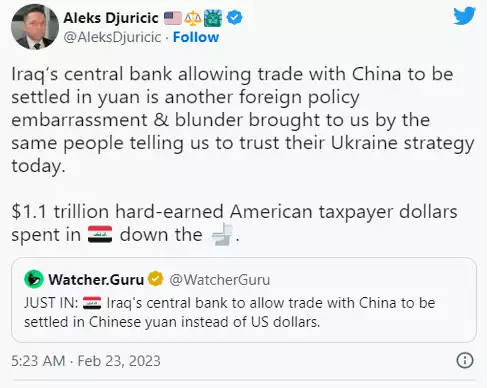Chinese Yuan Continues to Geopolitically Strengthen
News
|
Posted 23/02/2023
|
10133
Iraq’s central bank said yesterday that it planned to allow trade from China to be settled in Yuan for the first time in its nation’s history, in an attempt to improve access to the foreign currency.
“It is the first-time imports would be financed from China in Yuan, as Iraqi imports from China have been financed in US dollars only,” the government’s economic advisor, Mudhir Salih said.
This move comes on the precipice of Iraq recently signing an oil and gas deal with UAE’s Crescent Petroleum and most importantly, two other Chinese companies.
The goal of the deal is to develop six oil and gas fields to facilitate Iraq natural gas production for its local power stations, which in turn allow it to cut imports that are currently burdening the country’s national budget.
Additionally, it will further bolster Iraq’s already strong crude oil exports, which currently accounts for more than 90% of the nations’ revenue sources.
Iraq is the second largest oil exporter in the Organization of the Petroleum Exporting Countries (OPEC), with its revenue exceeding $115 billion in 2022.
In saying all this however, the main motivation behind this move to greater utilize the yuan more than likely stems from the determinant that recently imposed US capital controls have had on the Iraqi economy.
More specifically, last year the US Treasury began enforcing stricter controls on international transactions by Iraqi commercial banks, forcing them to comply with specific SWIFT global transfer system criteria to access their foreign reserves.
The move was allegedly meant to ‘curtail money laundering and illegal siphoning of dollars to Iran and other heavily sanctioned countries.’
However, as a biproduct of the new regulations, more than 80% of Iraq’s daily US dollar wire transfers could no longer be completed, effectively forcing Iraq to look for alternative solutions.

In fact, since the war in Ukraine began we have seen may other countries move away from the US dollar and towards the yuan, namely Russia, another example of Western internationally imposed regulations (or in this case specifically sanctions) coming back to bite them.
China’s strength as a global power is clearly growing as a direct consequence of western overreach. While the US economy on the other hand is continuing to struggle economically from inflationary pressures, declining real wages and of course as discussed throughout this article, international weaponisation of the USD, driving other nations to go against their own interest. It matters little whether we agree with sanctions or not, the impacts are the issue at hand, not the ethics.
It is no coincidence that central banks have been buying record amounts of gold.
If these opposing trends continue on their current path, increased international turmoil, both economically and geopolitically, will only worsen as time goes on and also put continued pressure on the USD and it hegemonic privilege.
Submit your question to [email protected] and SUBSCRIBE to the YouTube Channel to be notified when the GSS Insights video is live.
**********************************************************************************